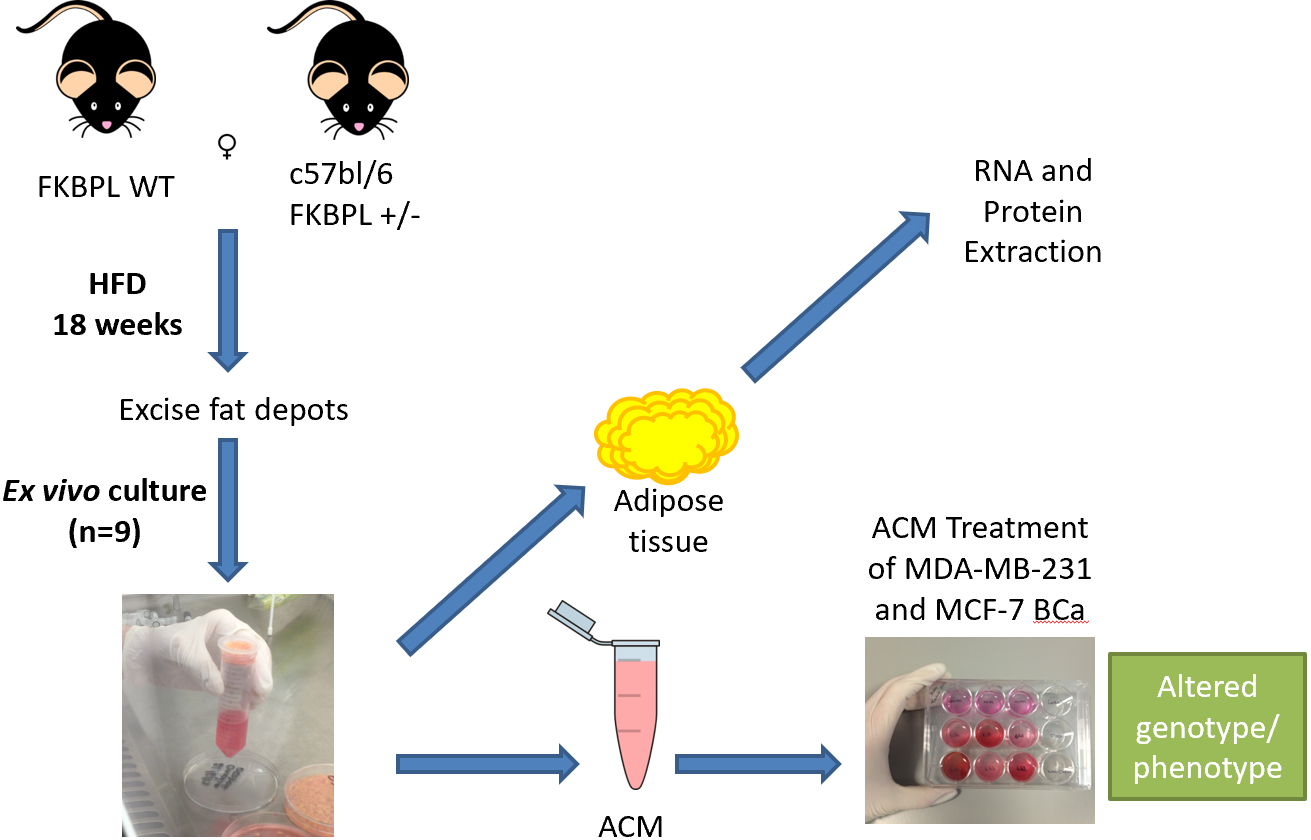Obesity is a risk factor for the development and recurrence of breast cancer, and current treatments tend to be less effective in obese patients. Co-culture of breast cancer (BC) cell lines with adipocytes or adipocyte-conditioned medium (ACM) drives a pro-tumorigenic phenotype1, however the molecular mechanisms underlying this effect are not fully known. FKBPL is a divergent member of the immunophilin protein family with anti-cancer activity. An FKBPL derived therapeutic peptide, ALM201, has completed phase I clinical trial2. FKBPL and its drug peptide have been shown to inhibit angiogenesis and cancer stemness activity in vitro in BC cell lines3. FKBPL has also been shown to be protective in BC disease outcomes 4. Like cancer, obesity is associated with dysregulated vasculature and inflammation. The adipocyte-cancer cell crosstalk leads to functional and phenotypical changes of both cell types. This microenvironment aids tumour onset and progression. Our group has shown that FKBPL deficient mice develop severe obesity. Thus, harnessing FKBPL could offer a novel approach to modulate obesity and protect against obesity-driven cancer. This study investigates whether FKBPL has a role in modulating obesity-driven BC through treatment of BC cell lines with adipose-conditioned media (ACM) from herozyogous (Het) Fkbpl+/- and wild-type (WT) Fkbpl+/+ C57bl/6 mice, and subsequent measurement of changes to cell viability/metabolic activity by MTT assay and gene expression profile changes using a QiagenRT2 Profiler qPCR gene array of 84 BC specific genes. FKBPL mRNA levels, measured via qPCR, were lower in HET adipose tissue compared to WT (n=3, p=0.0506, student t-test). MDA-MB-231 cells were treated with Het ACM, WT ACM or serum-free basal medium for 48 hr to determine changes to cell viability/metabolic activity by MTT assay. Cells treated with FKBPL+/- ACM had higher cell viability/metabolic activity compared to the WT or serum-free basal medium treated cells (n=3, p<0.01, one way ANOVA with Tukey’s multiple comparisons test). MDA-MB-231 and MCF-7 were treated with WT versus Het ACM for 24hr (n=1), cDNA was synthesised and run on qPCR array plates. A 1.5-fold cut off was used for analysis purposes. 3 genes were altered in MCF-7 + Het ACM versus WT ACM (ATM:-1.5 downregulation, BRCA2 1.5 upregulation, SERPINE1: 1.98 upregulation). 2 genes were altered in the MDA-MB-231 + Het ACM versus WT ACM (CDH1: 2.0 upregulation and FOXA1: 25.2 upregulation). The large upregulation in FOXA1 is of note given that similar to FKBPL it is a prognostic marker of triple negative BC and associated with a less aggressive cancer phenotype4. While validation is required our results show that ACM from HFD Fkbpl+/- mice can stimulate higher cellular metabolic activity and differential gene expression compared to WT ACM.
Future Physiology 2019 (Liverpool, UK) (2019) Proc Physiol Soc 45, PC19
Poster Communications: Investigating the Impact of FKBPL (FK506 binding protein like) on Obesity-Driven Breast Cancer
C. Barron1,2, G. Moore1, T. Robson1
1. Head of School of Pharmacy and Biomolecular Sciences, RCSI, Dublin, Ireland. 2. School of Medicine, Trinity College Dublin, Dublin, Ireland.
View other abstracts by:
Where applicable, experiments conform with Society ethical requirements.

